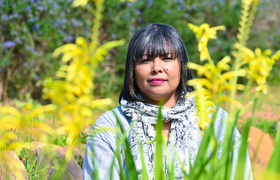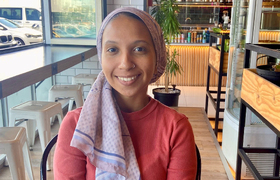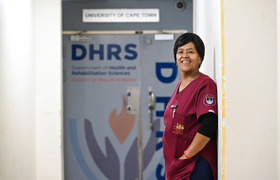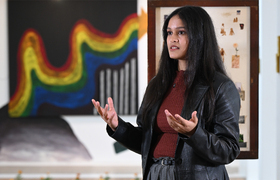Resilience and perseverance paid off
12 September 2025 | Story Myolisi Gophe. Photo Lerato Maduna. Read time 5 min.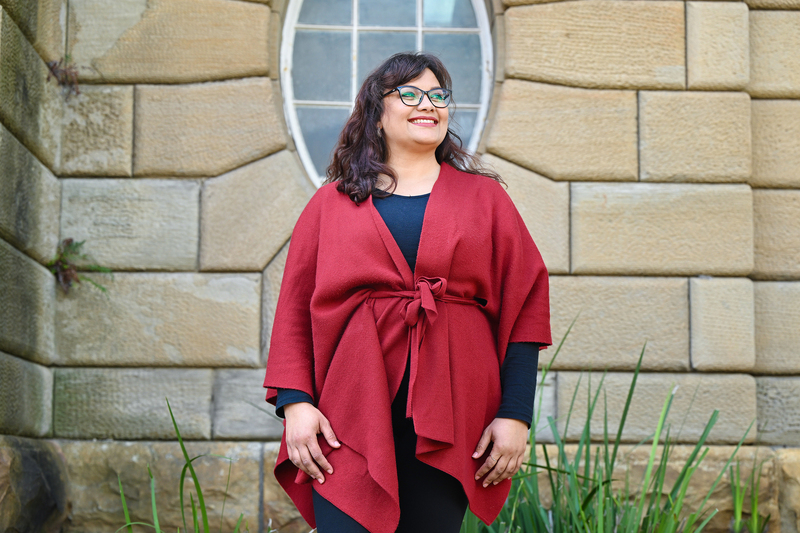
Despite facing personal trauma, financial strain, and years of setbacks, scientist Jodilee Erasmus’s journey to completing her master’s at the University of Cape Town (UCT) stands as an inspiring testament to resilience and the power of perseverance.
“I cried tears of gratitude when I submitted my thesis. I can’t explain the joy and relief,” Jodilee recalled. “For nine years, I went to bed every night thinking about the work I had to do on my thesis. But I did it.”
Born in Cape Town, Jodilee completed her Bachelor of Social Science at UCT in 2010 and an honours in psychology through UNISA in 2014. She joined the South African Medical Research Council (SAMRC) in 2012 as an intern and quickly built a reputation for translating complex HIV research into accessible information for the public and policy makers. Later, she joined the Mental Health, Alcohol, Substance use and Tobacco Research Unit (MASTRU), where she rose from research technologist to scientist.
But career advancement came with a condition: she needed a master’s degree. In 2015, she enrolled at the UCT Centre for Criminology, focusing on community perceptions of how police respond to substance use and users in Cape Town. What followed was a nearly decade-long test of endurance.
“If I didn’t pay my fees, I couldn’t register. And if I didn’t register, I couldn’t finish my degree.”
Jodilee’s first hurdle was financial. Initial promises of funding for her studies never materialised through an external funder. In 2017, she moved over to the Faculty of Health Sciences to better align her degree with her career. In 2018, she took a leave of absence due to the birth of her son. In 2019, she registered with the hope of finishing her degree in 2020. In early 2020, her son had a serious accident, which led him to the intensive care unit (ICU). While in the ICU, she received the news that her funding for her previous year was not approved. This, coupled with the high medical expenses, led to a period marked by low motivation and feelings of discouragement. “If I didn’t pay my fees, I couldn’t register. And if I didn’t register, I couldn’t finish my degree. I needed to take out loans to pay, but without the degree, I couldn’t get promoted at work and afford the instalments. I was in such a Catch-22.”
For years, she chipped away with monthly payments to UCT – all while raising her young son, covering household expenses, and holding down a demanding full-time job.
Her studies stalled. Between 2021 and 2024, while she was repaying her fees, her motivation eroded as “Every time I tried to push forward, something else went wrong.”
Finding the right mentor
Jodilee said she had amazing mentors and supervisors in Professor Virginia Zweigenthal and Professor Nadine Harker, who supported and challenged her, and tried their best to understand what she was going through. The catalyst for her graduation was the arrival of a new supervisor, Professor Leslie London. “He believed in me when I had stopped believing in myself. He took the time to understand my situation and helped me push through.”
With renewed support, Jodilee threw herself back into the work. Weekends, late nights, and stolen hours became her study time. Eventually, her employer stepped in to pay her fees, with the help of UCT, removing the final barrier.
“The moment I found out that I had passed, it brought me an overwhelming sense of peace and accomplishment.”
In February 2024, she submitted her thesis: “Community perceptions of South African Police Service responses to substance use, and the impact on health and well-being in a peri-urban community in Cape Town”.
Her study investigated how substance users, community leaders, and police officers perceive policing practices. She conducted focus groups with users, in-depth interviews with officers, and engaged community leaders. By analysing each perspective and seeing how they intersect, she identified overlapping issues, misconceptions, and practical strategies for improvement.
“It was about understanding what challenges these three groups face, and how relationships between police, substance use, people who use drugs (PWUDs) and communities interact, and how community leaders can be empowered to bridge gaps that are faced – to restore health and trust in the community”, she explained. “Each group gave recommendations, and I cross-referenced them with existing literature to create actionable strategies.”
Already, her findings are reaching audiences beyond academia. She has presented at national and regional conferences, shared insights with law enforcement bodies, and received invitations to international forums.
Relief, balance, and purpose
“The moment I found out that I had passed, it brought me an overwhelming sense of peace and accomplishment. I can’t explain the thankfulness to God for carrying me through,” Jodilee said.
Her research is gaining recognition, but perhaps more importantly, her personal life has shifted. “My son didn’t know a version of me that wasn’t stressed about my studies or the financial burden it placed on me. Now he sees me happy, present, and light. That’s my biggest victory.”
To students who feel overwhelmed, she offers clear advice: “Find a champion who can guide and advocate for you, communicate openly with supervisors, and never give up on your goals. Even when life feels impossible, keep going. I had to do this – for myself, for my career, and most of all, for my son.”
 This work is licensed under a Creative Commons Attribution-NoDerivatives 4.0 International License.
This work is licensed under a Creative Commons Attribution-NoDerivatives 4.0 International License.
Please view the republishing articles page for more information.







